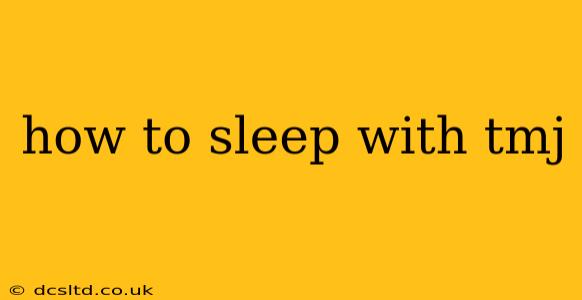Temporomandibular joint (TMJ) disorder can significantly disrupt sleep. The pain, clicking, and stiffness associated with TMJ can make finding a comfortable sleeping position nearly impossible, leading to fatigue and exacerbating the condition. Fortunately, several strategies can help you sleep better with TMJ. This comprehensive guide will explore various techniques, offering practical advice and solutions for a more restful night's sleep.
What is TMJ and How Does it Affect Sleep?
TMJ disorder affects the temporomandibular joints, which connect your jaw to your skull. Symptoms can range from mild discomfort to severe pain, impacting daily activities including sleep. The pain itself can be disruptive, but the jaw clenching and grinding (bruxism) common with TMJ often worsen at night, leading to headaches, jaw pain upon waking, and even earaches. The constant tension and discomfort can make it difficult to fall asleep and stay asleep, leading to sleep deprivation and further impacting your overall health.
How to Find the Best Sleeping Position for TMJ
Finding the right sleeping position is crucial for managing TMJ pain. Experiment with these options to discover what works best for you:
-
Sleeping on your back: This position can be ideal as it keeps your jaw aligned and reduces pressure on the TMJ. Using a supportive pillow that maintains the natural curve of your neck can further enhance comfort.
-
Sleeping on your side: Side sleeping can be acceptable, but choose the side that feels less painful. Using a supportive pillow can help maintain proper head and neck alignment, reducing strain on the jaw. Avoid sleeping on your stomach, as this position forces your jaw to twist unnaturally.
What Kind of Pillow is Best for TMJ?
Pillow selection plays a significant role in TMJ pain management. The goal is to support your head and neck in a neutral position, avoiding strain on your jaw. Consider these options:
-
Orthopedic pillows: These pillows are specifically designed to support the neck's natural curvature, reducing strain on the jaw.
-
Memory foam pillows: These conform to the shape of your head and neck, providing customized support and pressure relief.
-
Cervical pillows: These pillows offer targeted support for the neck, helping to maintain proper alignment. Avoid overly fluffy or thin pillows, which don't provide adequate support.
How to Reduce Jaw Clenching and Grinding at Night (Bruxism)?
Bruxism significantly worsens TMJ symptoms. Addressing this issue is vital for improved sleep:
-
Mouthguards: Custom-fitted mouthguards from a dentist are the most effective treatment for bruxism. They protect your teeth and prevent jaw clenching.
-
Stress management techniques: Stress is a major trigger for bruxism. Practicing relaxation techniques such as yoga, meditation, or deep breathing exercises can help reduce nighttime clenching.
-
Lifestyle adjustments: Avoiding caffeine and alcohol before bed can help relax your jaw muscles.
Can a Chiropractor Help with TMJ and Sleep?
Chiropractic care can be beneficial for TMJ. Chiropractors focus on aligning the spine and joints, which can alleviate pressure on the TMJ. They may use manual adjustments, massage, or other therapies to improve joint function and reduce pain. However, it’s essential to consult your doctor or a specialist before undergoing chiropractic treatment.
What Other Treatments Might Help My TMJ and Sleep?
In addition to the above, various other treatments can help manage TMJ and improve sleep:
-
Physical therapy: Exercises and stretches targeting the jaw muscles can help improve jaw mobility and reduce pain.
-
Medication: Pain relievers or muscle relaxants may be prescribed to alleviate pain and improve sleep.
-
Surgery: In severe cases, surgery may be considered as a last resort.
When Should I See a Doctor About My TMJ?
If your TMJ symptoms are severe, persistent, or interfering with your daily life, including your sleep, you should seek professional medical advice. Don't hesitate to consult your doctor or a specialist in TMJ disorders to get a proper diagnosis and treatment plan.
Remember, managing TMJ and improving sleep requires a holistic approach. By combining lifestyle adjustments, proper sleep hygiene, and potentially professional medical interventions, you can find relief and enjoy more restful nights. The information provided here is for general knowledge and shouldn't replace professional medical advice. Always consult a healthcare professional for diagnosis and treatment of TMJ disorder.
